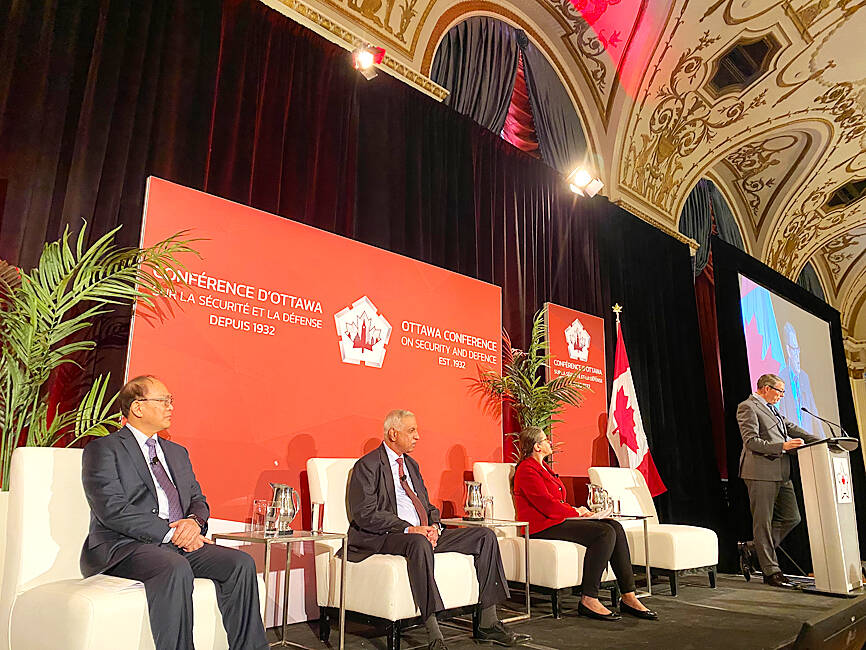The Special Committee on Canada-China Relations in the Canadian House of Commons on Thursday published its first report on Taiwan, which analysts in Taiwan have called a “breakthrough” in bilateral relations.
The report, titled Canada and Taiwan: A Strong Relationship in Turbulent Times, suggests that the two nations should launch diplomatic visits, and calls on the Canadian government to voice the position that Taiwan’s future can only be determined by Taiwanese.
The report also discusses Canada’s engagement with Taiwan, its trade with and investment in Taiwan, the state of regional peace and security in the Indo-Pacific region, and other issues related to Taiwan’s relationships with Canada and China.

Photo courtesy of the Taipei Economic and Cultural Office in Canada via CNA
The report is based on the testimonies at congressional hearings by Representative to Canada Harry Tseng (曾厚仁), Canadian government officials, academics, experts and others.
The report states that the People’s Republic of China (PRC) “has a ‘one China principle’ that is markedly different from Canada’s ‘one China policy.’”
The report cites one Canadian official who characterized Canada’s policy as a “very flexible approach” that was designed to be “strategically ambiguous.”
Conversely, China’s principle “holds that Taiwan is part of the PRC and should be reunited with mainland China,” and China considers visits to Taiwan by foreign government officials as being “inconsistent in bestowing an act of sovereignty to the state that China believes should be a province.”
The committee’s report also cites University of Ottawa professor and Macdonald-Laurier Institute senior fellow Scott Simon as saying that “Canada does not endorse the PRC’s claims over Taiwan.”
The report’s conclusion quotes Tseng as saying that “if Taiwan falls, democracy falls, and that will be the ultimate concern of all of us.”
Speaking to the Central News Agency, Tseng said that the report was the most significant development in Taiwan-Canada relations since the two nations severed diplomatic ties in 1970.
“The Canadian parliament has never published such a comprehensive report on Taiwan,” he said. “The report expresses support for Taiwan’s participation in international affairs, and also emphasizes the importance of economic, trade and diplomatic cooperation between the two countries.”
The report expresses support for Taiwan’s meaningful participation in the UN Permanent Forum on Indigenous Issues, which “would benefit indigenous peoples in Taiwan,” whereas Taiwan’s exclusion “contradicts” the forum’s purpose.
It also calls for Taiwan’s inclusion in the International Civil Aviation Organization and the WHO, and says that the Canadian government should evaluate Taiwan’s application to join the Comprehensive and Progressive Agreement for Trans-Pacific Partnership.
It also calls for progress on the Canada-Taiwan Foreign Investment Promotion and Protection Arrangement, and says that the Canadian minister of international trade should visit Taiwan to sign the agreement.
No Canadian minister has visited Taiwan since former Canadian minister of industry John Manley in 1998.
The report also calls on China to exercise restraint in the Taiwan Strait and cites Simon as saying that “Canada would continue to oppose economic coercion, as well as more overt military coercion and threats.”

AGING: As of last month, people aged 65 or older accounted for 20.06 percent of the total population and the number of couples who got married fell by 18,685 from 2024 Taiwan has surpassed South Korea as the country least willing to have children, with an annual crude birthrate of 4.62 per 1,000 people, Ministry of the Interior data showed yesterday. The nation was previously ranked the second-lowest country in terms of total fertility rate, or the average number of children a woman has in her lifetime. However, South Korea’s fertility rate began to recover from 2023, with total fertility rate rising from 0.72 and estimated to reach 0.82 to 0.85 by last year, and the crude birthrate projected at 6.7 per 1,000 people. Japan’s crude birthrate was projected to fall below six,

US President Donald Trump in an interview with the New York Times published on Thursday said that “it’s up to” Chinese President Xi Jinping (習近平) what China does on Taiwan, but that he would be “very unhappy” with a change in the “status quo.” “He [Xi] considers it to be a part of China, and that’s up to him what he’s going to be doing, but I’ve expressed to him that I would be very unhappy if he did that, and I don’t think he’ll do that. I hope he doesn’t do that,” Trump said. Trump made the comments in the context

SELF-DEFENSE: Tokyo has accelerated its spending goal and its defense minister said the nation needs to discuss whether it should develop nuclear-powered submarines China is ramping up objections to what it sees as Japan’s desire to acquire nuclear weapons, despite Tokyo’s longstanding renunciation of such arms, deepening another fissure in the two neighbors’ increasingly tense ties. In what appears to be a concerted effort, China’s foreign and defense ministries issued statements on Thursday condemning alleged remilitarism efforts by Tokyo. The remarks came as two of the country’s top think tanks jointly issued a 29-page report framing actions by “right-wing forces” in Japan as posing a “serious threat” to world peace. While that report did not define “right-wing forces,” the Chinese Ministry of Foreign Affairs was

PREPAREDNESS: Given the difficulty of importing ammunition during wartime, the Ministry of National Defense said it would prioritize ‘coproduction’ partnerships A newly formed unit of the Marine Corps tasked with land-based security operations has recently replaced its aging, domestically produced rifles with more advanced, US-made M4A1 rifles, a source said yesterday. The unnamed source familiar with the matter said the First Security Battalion of the Marine Corps’ Air Defense and Base Guard Group has replaced its older T65K2 rifles, which have been in service since the late 1980s, with the newly received M4A1s. The source did not say exactly when the upgrade took place or how many M4A1s were issued to the battalion. The confirmation came after Chinese-language media reported